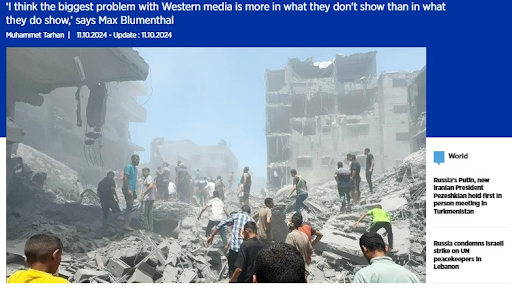
Massive demonstrations in cities across Morocco with thousands demanding an end to the Israeli genocide
Middle East News Review: Thousands of Moroccans demonstrated in the city of Casablanca (west) on Sunday, rejecting the Israeli genocide that the Gaza Strip has been subjected to since October 7, 2023.
The demonstration, called for by the "Moroccan Front to Support Palestine" (non-governmental), toured the main streets of the city, before heading to Al-Shajar Street, according to an Anadolu Agency correspondent.
The participants expressed their rejection of targeting leaders and the sovereignty of states, demanding an end to the aggression against Palestine and Lebanon.
The demonstration was organized under the slogan "Stop the barbaric Zionist aggression against the Palestinian and Lebanese peoples", and was attended by human rights activists and politicians.
The participants raised the flags of Palestine and Lebanon, and pictures of the head of the political bureau of Hamas, Yahya Sinwar, Ismail Haniyeh, its former leader, and Hassan Nasrallah, the secretary-general of "Hezbollah", denouncing their assassination.
The participants chanted slogans in support of the Gazans, including "Moroccan greetings... to proud Gaza", "Morocco and Palestine... one people, not two peoples", "Haniyeh left a will, no compromise on the cause", "Sinwar, martyr, we are still on the path", and "Sinwar, rest, we will continue the struggle".
In Morocco, extensive solidarity campaigns with Gaza continue, including demonstrations and protests, donation campaigns and solidarity evenings.
With American support, Israel has been waging a genocidal war on Gaza since October 7, 2023, leaving more than 142,000 Palestinians dead and wounded, most of them children and women, and more than 10,000 missing, amid massive destruction and famine that killed dozens of children and elderly people, in one of the worst humanitarian disasters in the world.
Tel Aviv continues this war, ignoring the UN Security Council resolution to end it immediately, and the International Court of Justice’s orders to take measures to prevent acts of genocide and improve the catastrophic humanitarian situation in Gaza.










































